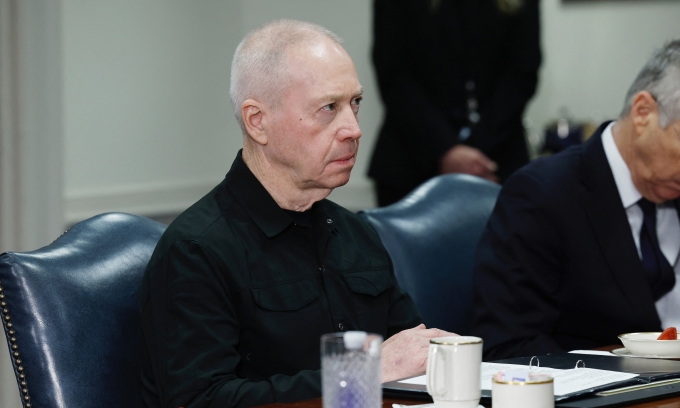Decades of simmering political disagreements have made it difficult for three key members of Israel's war cabinet to find common ground amid the fighting.
Six months into the conflict with Hamas, the Israeli public remains deeply divided over how to win the war in Gaza. As the three senior leaders in the war cabinet, Prime Minister Benjamin Netanyahu, Defense Minister Yoav Gallant and opposition leader Benny Gantz must work to find unity on that goal.
But simmering political rivalry and disagreements have soured relations between Israel’s wartime decision-makers. The three often sparred over major decisions, such as how to conduct the decisive Gaza offensive, rescue hostages and manage the strip after the conflict.
Now, these three politicians must come together to make one of the most important decisions in the country: how to respond to Iran’s first direct attack on Israeli territory. The power struggles between the three will have a profound impact on Israel’s response, which could determine the future of the entire Middle East.
“These three clearly have a deep distrust of each other,” said Giora Eiland, a former Israeli national security adviser.
Israel's War Cabinet was formed on November 11, 2023, just five days after the Gaza war broke out, to coordinate combat operations effectively. The War Cabinet is authorized to update military and strategic objectives in the conflict, but all decisions need to be approved by the Security Cabinet, chaired by Prime Minister Netanyahu.
However, disagreements have arisen as Mr Netanyahu, Israel's longest-serving prime minister, increasingly tries to direct the war in Gaza himself, while Mr Gallant and Mr Gantz are said to be trying to prevent Mr Netanyahu from making unilateral decisions.
On January 15, former Israeli Prime Minister Yair Lapid, a member of the opposition, said that Netanyahu and Defense Minister Gallant were “no longer speaking to each other.” Lapid said that the war cabinet meetings had become “arenas for point-scoring, fighting and discussions that lead nowhere.”

The Israeli cabinet met with Prime Minister Benjamin Netanyahu and security officials in the early morning of April 14 in Tel Aviv to monitor developments of the attack from Iran. Photo: AFP
Prime Minister Netanyahu often kept Gallant and Gantz in the dark about major decisions, according to current and former Israeli officials. In an effort to control the flow of supplies into Gaza, Netanyahu appointed a humanitarian aid official who reported directly to the prime minister’s office, bypassing the other two leaders in his wartime cabinet.
“It is difficult for the prime minister to ask the military to do what he wants if the defense minister does not agree. The lack of cooperation between them makes things very difficult,” said Amir Avivi, founder of the Israel Defense and Security Forum think tank.
Tensions between individuals in Israel's war cabinet have been simmering for more than a decade. In 2010, Netanyahu's government nominated Gallant, a 30-year veteran of the Israeli armed forces, to head the army.
After being nominated, Mr. Gallant was accused of running a smear campaign against other candidates, including Gantz. Gallant denied the allegations, but the scandal cost him his job as head of the Ministry of Defense.
Benny Gantz served as army chief from 2011 to 2015, leading two major campaigns against Hamas in Gaza. He then used this leverage to launch his political career, founding a new party in 2019 and becoming Mr Netanyahu’s main rival in the elections.
However, three elections in the following year did not result in a clear victory for either Gantz or Netanyahu. In 2020, the two agreed to form a governing coalition and take turns serving as prime minister, ending a period of political instability in Israel. However, the agreement collapsed within a year.
Gantz accused Netanyahu of blocking him from taking over as prime minister, while Netanyahu said he could not run a government with Gantz. In the 2021 election, Gantz's party won fewer seats in parliament and "left in pain," said Reuven Hazan, a political scientist at the Hebrew University of Jerusalem.
In 2023, Netanyahu’s new government sought to reform Israel’s judicial system, sparking months of protests that included many reservists. Fearing a crisis in the military that threatened national security, Defense Minister Gallant urged the prime minister to delay the judicial reform plan.
The Israeli prime minister fired Gallant, sparking strikes and severe unrest, which led him to suspend the judicial reform bill. Gallant was reinstated two weeks later.
Hamas’s offensive into southern Israel in early October 2023 brought the three men back together in the war cabinet, with Gantz and Gallant trying to put aside their differences to get the job done for the country.

Israeli Defense Minister Yoav Gallant at the Pentagon on March 26. Photo: AFP
However, tensions have risen between the two and Mr Netanyahu, with the Israeli prime minister blaming the defence and intelligence agencies for security failures during the Hamas attack. After drawing criticism from Gantz, Mr Netanyahu has apologised.
The defense minister proposed a preemptive strike against Hezbollah in Lebanon, but Netanyahu rejected it. Netanyahu and Gallant began holding separate press conferences, sometimes within minutes of each other. When asked why they held separate press conferences, Netanyahu said he had proposed a joint conference, but Gallant said he would make his own decisions.
Under intense pressure from the far-right faction of his ruling coalition, Prime Minister Netanyahu announced earlier this month that he would send troops to attack the city of Rafah in Gaza, considered the last Hamas stronghold and home to more than a million Palestinians. But his idea was met with resistance from Defense Minister Gallant, who did not want to upset the United States.
The US has opposed Israel’s Rafah operation and Gallant fears Netanyahu’s decision to attack could damage relations between the two countries and cost them vital US financial and military support. President Joe Biden told the Israeli prime minister earlier this month that future US support would depend on how Israel treats civilians in Gaza.
The three leaders also have different ideas about Gaza's future after the conflict. Prime Minister Netanyahu does not want the Palestinian Authority in the West Bank to take over any role in Gaza and wants the Israeli military to work with local leaders to govern the area.
Meanwhile, Israel's defense minister said that letting the Palestinian Authority take over Gaza is the best option. He said it is better to leave Gaza in chaos than to have Israeli soldiers administer the land.
Netanyahu canceled a visit to Washington last month to protest the US failure to veto a UN Security Council resolution calling for an unconditional ceasefire in Gaza. Gallant then went ahead with the visit without the prime minister.
Opposition leader Gantz also flew to Washington last month, despite the prime minister’s objections. The Biden administration has publicly welcomed Gantz, while expressing disappointment with Netanyahu.
How to free the hostages held by Hamas in Gaza is also an area where Israel’s three wartime cabinet leaders have been unable to find common ground. Mr Gantz has publicly called for a deal to free the hostages, saying their lives are in danger, while Mr Netanyahu and Mr Gallant have insisted that only military pressure and negotiations will free the hostages.
However, Mr Netanyahu controlled Israel's negotiating team and at times took a hard line on the terms of the deal with Hamas. The Israeli prime minister has criticized many for wrongly saying he deliberately tried to block the deal, while those close to him say he is a tough negotiator.
US efforts to broker a six-week ceasefire have been hampered by an Israeli airstrike in northern Gaza that killed three sons of Hamas political leader Ismail Haniyeh.
As talks stalled, thousands of people protested in Israel against Netanyahu's handling of the conflict. Mr Grantz earlier this month called for early elections in September.
Opinion polls show that Mr. Gantz is the most popular leader in Israel. In case Mr. Netanyahu faces strong public opposition and has to give up power, Gantz would be the most potential politician to replace him.

Prime Minister Benjamin Netanyahu (left), Defense Minister Yoav Gallant (center) and opposition leader Benny Gantz at a press conference in Tel Aviv, Israel in November 2023. Photo: TOI
Cracks are emerging in Netanyahu’s wartime coalition as Israel continues its campaign in Gaza and faces new security challenges, including last weekend’s Iranian attack.
The three members of the war cabinet have met every day since Iran launched hundreds of missiles and drones at Israel on the evening of April 13. They have pledged to respond to Tehran, but have been unable to agree on the timing, scope and location of the action. They face pressure to strike a balance between responding to Iran and avoiding escalating the conflict into a regional war that would alienate U.S. and Arab allies.
President Biden has urged Israelis to exercise caution in any decision to respond to the raid, while ruling out the possibility of US participation in Tel Aviv's attack on Iranian territory.
“The risk of miscalculation is huge. We are entering a dangerous phase in the Israel-Iran conflict,” said Raz Zimmt, a senior researcher at the Institute for National Security Studies in Tel Aviv.
Thanh Tam (According to WSJ, AFP, Reuters )
Source link







![[Photo] Prime Minister Pham Minh Chinh and Prime Minister of the Kingdom of Thailand Paetongtarn Shinawatra attend the Vietnam-Thailand Business Forum 2025](https://vphoto.vietnam.vn/thumb/1200x675/vietnam/resource/IMAGE/2025/5/16/1cdfce54d25c48a68ae6fb9204f2171a)

























![[Photo] President Luong Cuong receives Prime Minister of the Kingdom of Thailand Paetongtarn Shinawatra](https://vphoto.vietnam.vn/thumb/1200x675/vietnam/resource/IMAGE/2025/5/16/52c73b27198a4e12bd6a903d1c218846)































































Comment (0)